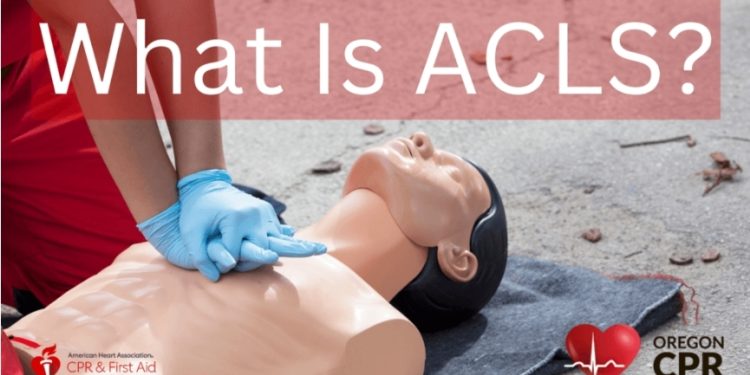Non-medical professionals encompass individuals in various fields such as education, business, industry, and public service, who do not have primary roles in healthcare but may encounter emergency situations in their work environments.
Are you wondering about ACLS certification’s relevance outside the field of healthcare being a non-medical professional?
From workplace safety to invaluable skill acquisition, the impact of ACLS certification is quite surprising. Today with the growing emphasis on safety and emergency preparedness, the need for non-medical professionals to possess these skills has never been more crucial.
Additionally, with the convenience of online ACLS renewal for healthcare professionals, accessibility has never been easier. Let us now move on and shed some light on how ACLS training can benefit individuals way beyond the traditional medical scope.
The Need to pursue ACLS Certification Outside the Medical Field.
In today’s times, the relevance of ACLS (Advanced Cardiac Life Support) certification goes beyond traditional medical settings. While typically associated with healthcare professionals, the question arises: Why should non-medical individuals pursue ACLS certification?
So, let’s look at a few reasons for non-medical professionals to consider this valuable certification.
Enhancing Emergency Response: Imagine being confident and prepared to handle medical emergencies like cardiac arrest or stroke, even if you’re not in a hospital. ACLS training will actually equip you with crucial skills to respond effectively in very high-pressure situations.
Fostering a Safer Environment: In any workplace or public setting, unexpected medical crises can arise. It truly supports non-medical individuals to contribute to a safer environment. It shows them how to be ready to give immediate assistance whenever it is needed.
Elevating Personal Development: By pursuing ACLS certification, non-medical professionals not only enhance their own skill set but also demonstrate a commitment to the well-being of those around them. This dedication to learning affects both personally and within the community to a huge degree.
ACLS certification isn’t just for healthcare professionals. Whether you’re in an office, a school, or any public space, having ACLS skills can make a real difference when it matters most.
Skills Non-Medical Individuals can Gain from ACLS Training.
Ever imagined having the ability to respond confidently and effectively in a medical emergency, even without a medical background? ACLS training can make this a reality.
Non-medical individuals stand to gain invaluable skills from ACLS training, equipping them to handle critical situations with composure and expertise. Let’s uncover the specific skills that non-medical individuals can acquire through ACLS training and the impact these competencies can have in diverse settings.
- Comprehensive Emergency Assessment: ACLS training provides non-medical individuals with the ability to perform a systematic and thorough assessment of individuals in medical distress, enabling a timely and accurate response in critical situations.
- Proficient Use of Emergency Equipment: Participants learn to effectively use emergency equipment such as defibrillators and specialized airway management devices, empowering them to provide immediate assistance with confidence and precision.
- Collaborative Team Dynamics: ACLS training emphasizes effective communication and teamwork in high-pressure scenarios, allowing non-medical individuals to seamlessly integrate into emergency response teams and contribute meaningfully to patient care.
By undergoing ACLS training, non-medical individuals can develop essential skills in comprehensive emergency assessment, proficient use of emergency equipment, and collaborative team dynamics. These competencies not only enhance their ability to respond to medical emergencies effectively but also contribute to a safer and more secure environment in various non-medical settings.
The benefits of ACLS Training for Non-Medical Workplace and its Safety.
When it comes to workplace safety, the significance of ACLS (Advanced Cardiac Life Support) training extends beyond traditional medical environments. Non-medical professionals can greatly benefit from ACLS training, as it equips them with vital skills to enhance workplace safety and respond effectively to medical emergencies. Let’s explore how ACLS training can contribute to non-medical workplace safety and the valuable impact it can have in diverse professional settings.
Prompt Emergency Response
ACLS training empowers non-medical individuals to recognize and respond swiftly to medical emergencies in the workplace, fostering a safer environment for employees and visitors alike.
Better readiness during an emergency
By undergoing ACLS training, non-medical professionals gain the knowledge and confidence to handle unforeseen medical crises, thereby contributing to a workplace culture that prioritizes emergency preparedness and proactive safety measures.
Improved Crisis Management
The skills acquired through ACLS training enable non-medical professionals to take an active role in crisis management, ensuring a coordinated and effective response to medical emergencies within the workplace.
Conclusion
ACLS training directly benefits non-medical workplace safety by facilitating prompt emergency response, enhancing emergency preparedness, and improving crisis management. These competencies not only mitigate potential risks but also foster a workplace culture that prioritizes the well-being of all individuals within the professional environment.
Furthermore, the ease of online ACLS renewal for healthcare professionals offers non-medical professionals a convenient means to sustain their skills, ensuring ongoing preparedness and a continued focus on workplace safety.


 Home
Home









